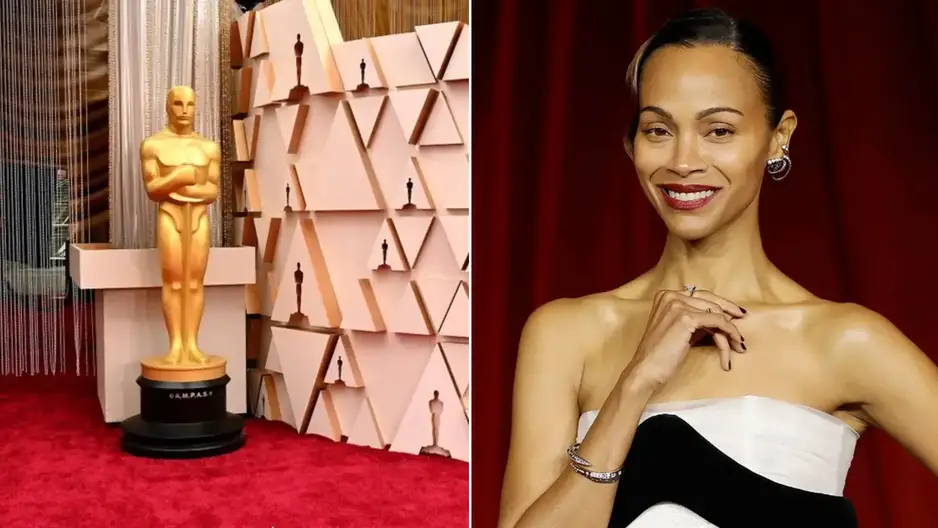Zoe Saldaña, the acclaimed actress known for her roles in *Avatar*, *Guardians of the Galaxy*, and *Star Trek*, recently found herself at the center of a surprising controversy when she was reportedly banned from entering the Oscars red carpet. The reason given by organizers? Her presence was deemed “too woke.”

The incident occurred just hours before the 2024 Academy Awards, one of Hollywood’s most prestigious events. Saldaña, who has long been admired for her trailblazing roles in major franchises and her outspoken advocacy for diversity and representation in film, was set to attend the ceremony. However, sources close to the event claim that the actress was unexpectedly told she would not be allowed on the red carpet, despite having a ticket and being an invited guest.
According to eyewitness accounts, Saldaña was initially escorted to the entrance of the red carpet, but she was stopped by security and informed that she would not be allowed entry. “Your presence is too woke for us,” a source allegedly overheard one of the event organizers saying. The comment was reportedly made in a dismissive tone, and the actress was told that her public stance on diversity and representation in Hollywood was not aligned with the “image” the Academy wished to project.
The phrase “too woke” is often used as a dismissive term by critics of social justice movements and the growing emphasis on inclusion and diversity in entertainment. For Saldaña, who has consistently used her platform to push for greater representation of people of color and women in Hollywood, the comment struck a deep and personal chord. It also reignited the larger debate about “wokeness” in entertainment and the backlash against efforts to make the industry more inclusive and representative of diverse voices.
Saldaña, who has spoken extensively about her experiences as a woman of color in the entertainment industry, has long been an advocate for breaking down barriers for marginalized communities. She played Neytiri in *Avatar*, a role that has been praised for its cultural significance, and she portrayed the fierce and complex Gamora in *Guardians of the Galaxy*, another character that resonates deeply with fans for her strength and complexity. Beyond her acting career, Saldaña has been a vocal proponent of diversity and inclusivity both on-screen and behind the scenes, working to uplift other women and people of color in an industry historically dominated by white men.

The banishment from the Oscars red carpet, however, highlights the ongoing friction between Hollywood’s elite and the increasing demand for social change within the entertainment industry. In recent years, there has been growing scrutiny over the lack of representation in major film productions, as well as the industry’s tendency to marginalize stories that center on people of color, women, and other underrepresented groups. Movements like #OscarsSoWhite and the push for greater diversity in film have been met with resistance by some, but they have also sparked crucial conversations about what it means to create an equitable and inclusive entertainment landscape.
For some, the idea of “wokeness” has become a polarizing issue. Critics argue that it represents an overemphasis on political correctness and social issues at the expense of art and creativity. Supporters, on the other hand, view it as an essential step toward rectifying systemic inequalities that have persisted in Hollywood for decades. The Oscars, as the highest-profile event in the film industry, has become a battleground for this ideological clash. Saldaña’s exclusion from the red carpet could be seen as a symbolic reflection of the larger tensions within Hollywood, where calls for diversity are often met with resistance from a segment of the industry that feels uncomfortable with change.
While the incident was shocking, it is not entirely out of line with the ongoing backlash against efforts to diversify Hollywood. Recently, several high-profile celebrities have been criticized for their outspoken political stances, and many of them have faced consequences in the form of boycotts or exclusion from prestigious events. The Oscars, in particular, has been a flashpoint for such controversies. Over the years, the Academy has faced criticism for its lack of diversity and its reluctance to embrace the changing dynamics of the entertainment industry. Saldaña, as an advocate for greater representation, could be seen as embodying the very ideals that many critics view as “too woke” for the traditional, conservative nature of the Academy Awards.

In the wake of the incident, Saldaña took to social media to express her disappointment and frustration. She shared a heartfelt message, stating, “My presence at the Oscars was meant to celebrate not just my own achievements but those of everyone working toward a more inclusive and representative industry. I will continue to fight for that vision, no matter the obstacles. Being ‘woke’ is not a threat. It’s a promise to make the world a better place.”
The incident has sparked a larger conversation about the role of celebrities and influencers in advocating for social change. While some argue that entertainment figures should stick to their craft and avoid engaging in politics, others contend that their platform gives them a unique responsibility to speak out on issues that matter. In Saldaña’s case, her activism has often gone hand-in-hand with her career, making her one of the most high-profile examples of an entertainer using their platform to challenge the status quo.
As the dust settles from the Oscars controversy, it remains to be seen how this incident will affect Saldaña’s career and her relationship with the Academy. It is clear, however, that the debate surrounding “wokeness” in Hollywood is far from over. If anything, the controversy surrounding Saldaña’s exclusion from the red carpet has only intensified the conversation about the future of the entertainment industry, and whether it will embrace true inclusivity or continue to resist the changes that many feel are long overdue.



